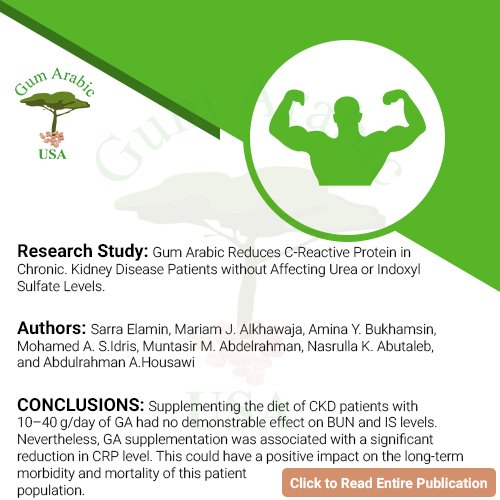CRP LEVEL EFFECT
There is overwhelming scientific research and medical studies done worldwide that prove Gum Arabic's Nutritional and Medicinal properties. Below we have highlighted and provided links to some of the Research publications regarding Gum Arabic aka Acacia Gum and all the conclusions. To read the entire research publication, simply click on the summary images. Do not make any medical decisions based on this information and always consult your doctor.
** This information has not been evaluated by the FDA. Products sold and Information presented are not intended to diagnose, treat, cure, or prevent any disease**
This study investigates the effects of Gum Arabic (GA), a complex polysaccharide with prebiotic properties, on chronic kidney disease (CKD) patients. Thirty-six CKD patients were randomly assigned to receive different daily doses of GA for four weeks.
Introduction: Chronic kidney disease (CKD) often involves chronic inflammation, potentially originating from the gut. High levels of urea in the colon, impaired protein breakdown in the small intestine, and constipation contribute to this inflammation. Uremic retention molecules like indoxyl sulfate (IS) and p-cresyl sulfate (PCS) are associated with CKD progression and cardiovascular disease. This study explores the potential of dietary interventions targeting the gut microbiome to alleviate CKD-related inflammation. Gum Arabic (GA), a fermentable dietary fiber with prebiotic properties, is examined for its systemic effects.
Methods: This randomized clinical trial involved 36 CKD patients who received different doses of GA daily for four weeks. Data, including clinical interviews, blood samples, and 24-hour urine collections, were collected before and after the intervention. Statistical analysis was performed using SPSS version 19.
Results: Out of 89 invited patients, 36 participated in the study. GA supplementation led to a statistically significant decrease in serum sodium levels and CRP levels but had no impact on urea, creatinine, IS levels, or other inflammatory markers. Notably, even the group receiving only 10g/day of GA showed a significant reduction in CRP levels.
Discussion: GA is a highly fermentable dietary fiber with promising prebiotic effects. However, in contrast to previous studies, this trial did not observe a decrease in urea and IS levels in CKD patients. This might be due to the relatively lower baseline levels in this cohort. The reduction in CRP levels suggests that GA could help alleviate inflammation in predialysis CKD patients, a previously unobserved effect.
Conclusions: GA supplementation in CKD patients did not affect urea or IS levels but significantly reduced CRP levels. This anti-inflammatory effect could potentially benefit CKD patients' long-term health and warrants further investigation in larger, controlled trials.


